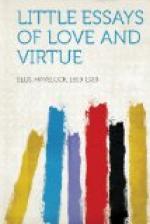Birth-control is effecting, and promising to effect, many functions in our social life. By furnishing the means to limit the size of families, which would otherwise be excessive, it confers the greatest benefit on the family and especially on the mother. By rendering easily possible a selection in parentage and the choice of the right time and circumstances for conception it is, again, the chief key to the eugenic improvement of the race. There are many other benefits, as is now generally becoming clear, which will be derived from the rightly applied practice of birth-control. To many of us it is not the least of these that birth-control effects finally the complete liberation of the spiritual object of marriage.
CHAPTER IV
HUSBANDS AND WIVES
It has always been common to discuss the psychology of women. The psychology of men has usually been passed over, whether because it is too simple or too complicated. But the marriage question to-day is much less the wife-problem than the husband-problem. Women in their personal and social activities have been slowly expanding along lines which are now generally accepted. But there has been no marked change of responsive character in the activities of men. Hence a defective adjustment of men and women, felt in all sorts of subtle as well as grosser ways, most felt when they are husband and wife, and sometimes becoming acute.
It is necessary to make clear that, as is here assumed at the outset, “man” and “husband” are not quite the same thing, even when they refer to the same person. No doubt that is also true of “woman” and “wife.” A woman in her quality as woman may be a different kind of person from what she is in her function as wife. But in the case of a man the distinction is more marked. One may know a man well in the world as a man and not know him at all in his home as a husband; not necessarily that he is unfavourably revealed in the latter capacity. It is simply that he is different.
The explanation is not really far to seek. A man in the world is in vital response to the influences around him. But a husband in the home is playing a part which was created for him long centuries before he was born. He is falling into a convention, which, indeed, was moulded to fit many masculine human needs but has become rigidly traditionalised. Thus the part no longer corresponds accurately to the player’s nature nor to the circumstances under which it has to be played.
In the marriage system which has prevailed in our world for several thousand years, a certain hierarchy, or sacred order in authority, has throughout been recognised. The family has been regarded as a small State of which the husband and father is head. Classic paganism and Christianity differed on many points, but they were completely at one on this. The Roman system was on a patriarchal basis and continued




